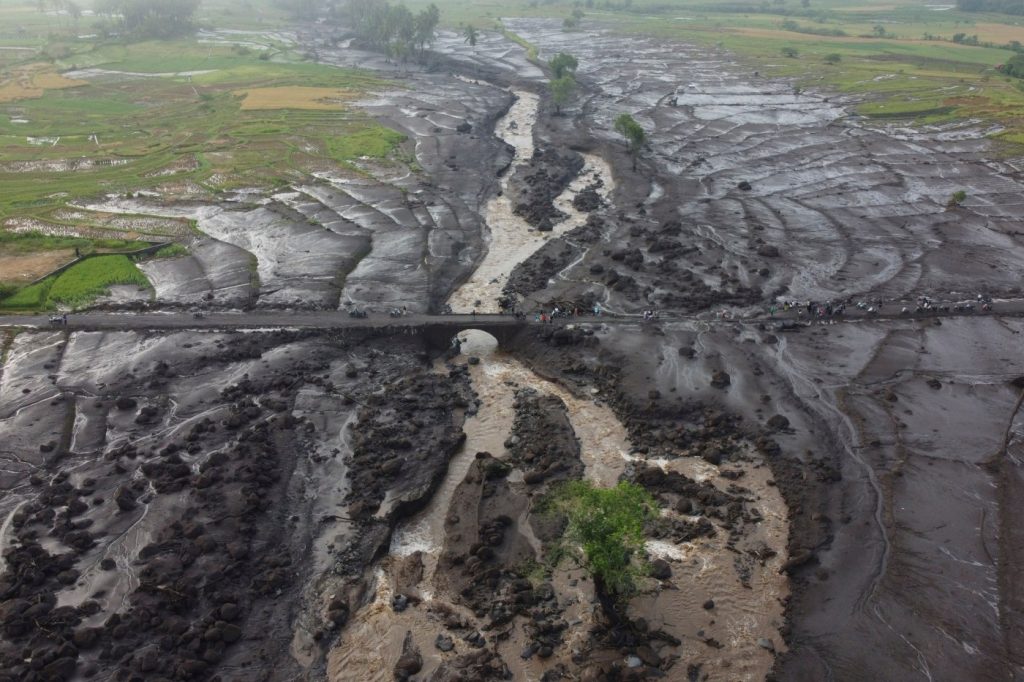By Kasparman Piliang | Associated Press
PADANG, Indonesia — Rescuers recovered more bodies Monday after monsoon rains triggered flash floods on Indonesia’s Sumatra Island over the weekend, bringing down torrents of cold lava and mud that left at least 44 people dead and another 15 missing.
The heavy rains, along with a landslide of mud and cold lava from Mount Marapi, caused a river to breach its banks. The deluge tore through mountainside villages along four districts in West Sumatra province just before midnight Saturday.
The floods swept away people and submerged hundreds of houses and buildings, while forcing more than 3,100 to flee to temporary government shelters in Agam and Tanah Datar districts, said National Disaster Management Agency spokesperson Abdul Muhari.
Cold lava, also known as lahar, is a mixture of volcanic material and pebbles swept by rainwater down a volcano’s slopes.
Additional bodies were recovered Monday, bringing the death toll to 44, Muhari said in a news conference. At least 19 others were injured in the flash floods and rescuers were searching for 15 villagers, he said.
Television reports showed relatives wailing as they watched rescuers pull a mud-caked body from a devastated hamlet. It was placed in an orange and black bag and taken away for burial.
Authorities struggled to get tractors and other heavy equipment to the area over washed-out roads after flash floods covered the hilly hamlets with mud and rocks, said Abdul Malik, who heads the search and rescue office in Padang, the provincial capital.
Hundreds of police, soldiers and residents dug through the debris with their hands, shovels and hoes as rain, damaged roads and thick mud hampered their progress.
“The devastated area is so vast and complicated, we badly need more excavators and mud pumps,” Malik said.
Videos released by the National Search and Rescue Agency showed roads that were transformed into murky brown rivers and villages covered by thick mud, rocks, and uprooted trees.
Muhari said the search and rescue operation was halted late Monday due to darkness and rains that made the devastated areas along the rivers unstable. The operation will resume early Tuesday.
Related Articles
A strange fungus could transform emerging cicadas into ‘saltshakers of death,’ scientists say
The surprising force stalling climate progress: California restaurants
Photos: Aurora borealis from the Bay Area and far beyond
Opinion: Accepting fossil fuel funds undermines Stanford’s new Sustainability School
Photos: Tour of the 1,732-foot-long tunnel at the Anderson Dam project
Heavy rains cause frequent landslides and flash floods in Indonesia, an archipelago nation of more than 17,000 islands where millions of people live in mountainous areas or near floodplains.
The weekend disaster came just two months after heavy rains triggered flash floods and a landslide in West Sumatra, killing at least 26 people and leaving 11 others missing.
A surprise eruption of Mount Marapi late last year killed 23 climbers. The mountain’s sudden eruptions are difficult to predict because the source is shallow and near the peak, according to Indonesia’s Center for Volcanology and Geological Disaster Mitigation.
Marapi has been active since an eruption in January 2024 that caused no casualties. It is among more than 120 active volcanoes in Indonesia. The country is prone to seismic upheaval because of its location on the Pacific “Ring of Fire,” an arc of volcanoes and fault lines encircling the Pacific Basin.
Associated Press writer Niniek Karmini in Jakarta, Indonesia contributed to this report.


